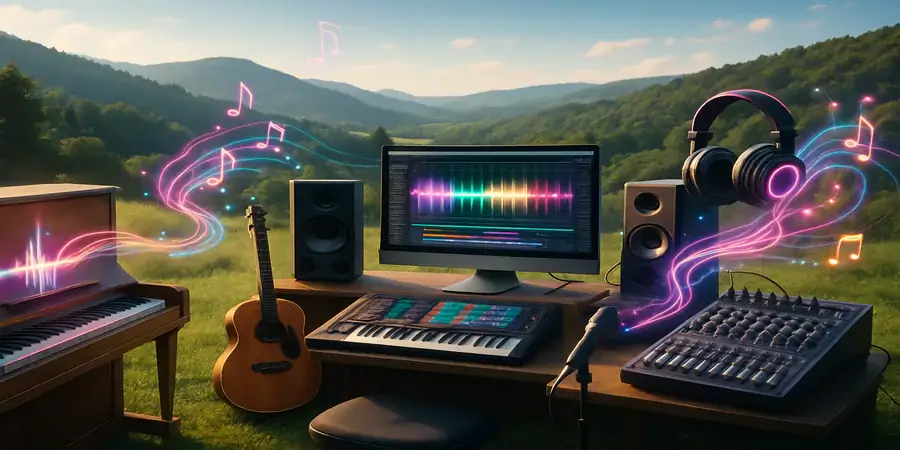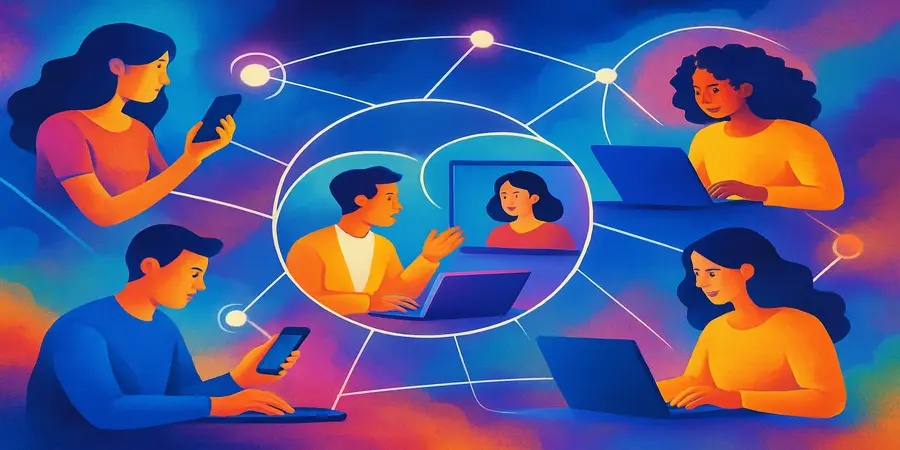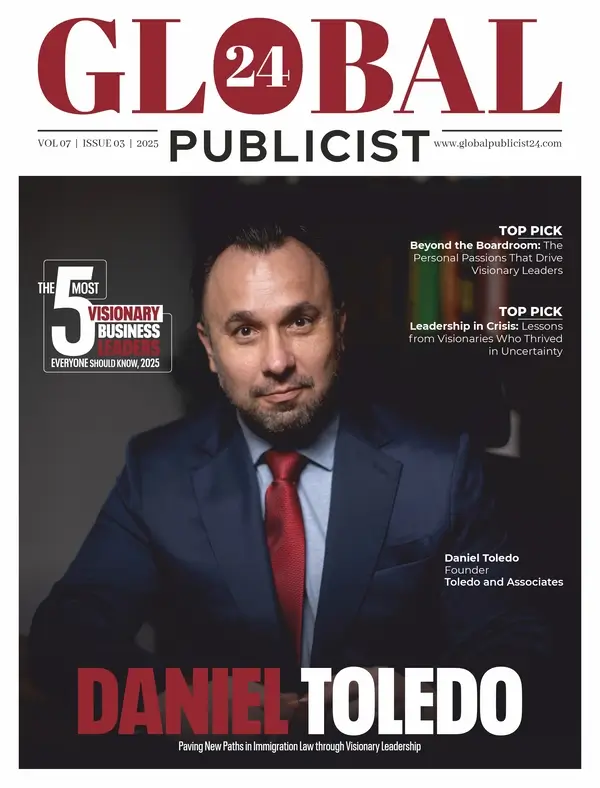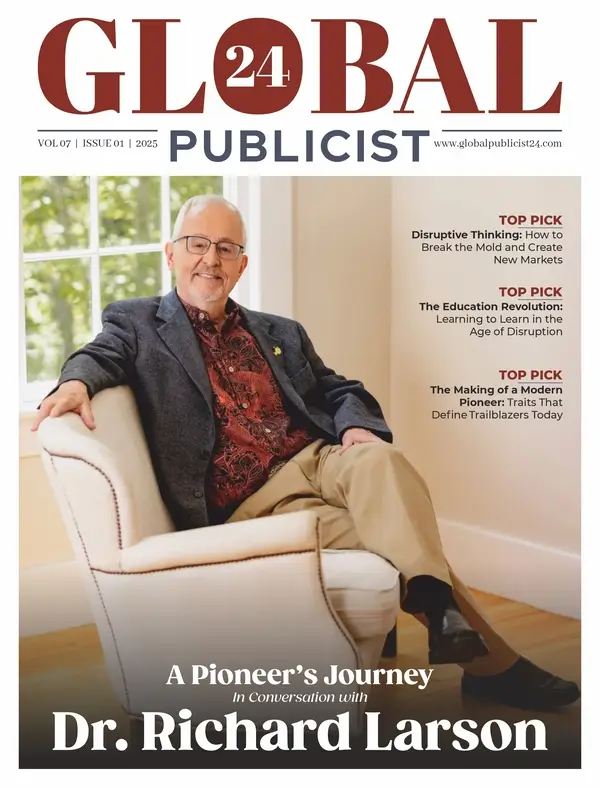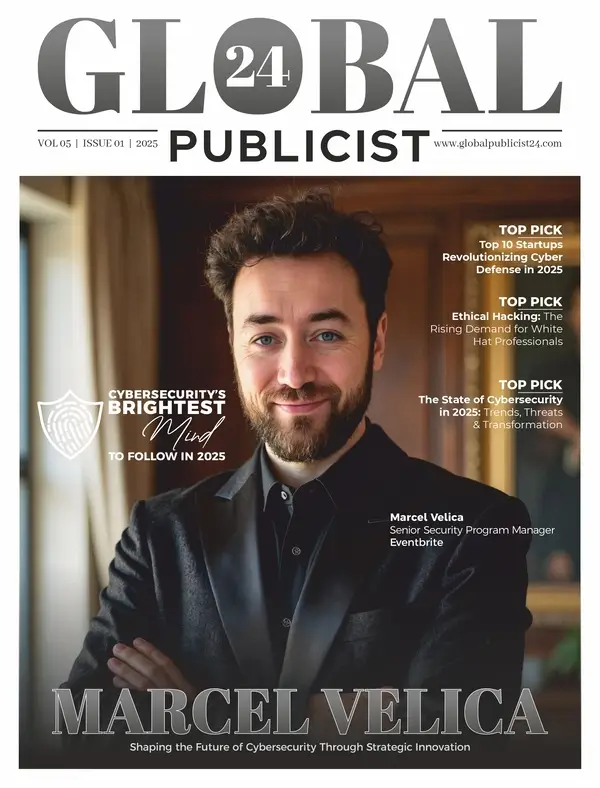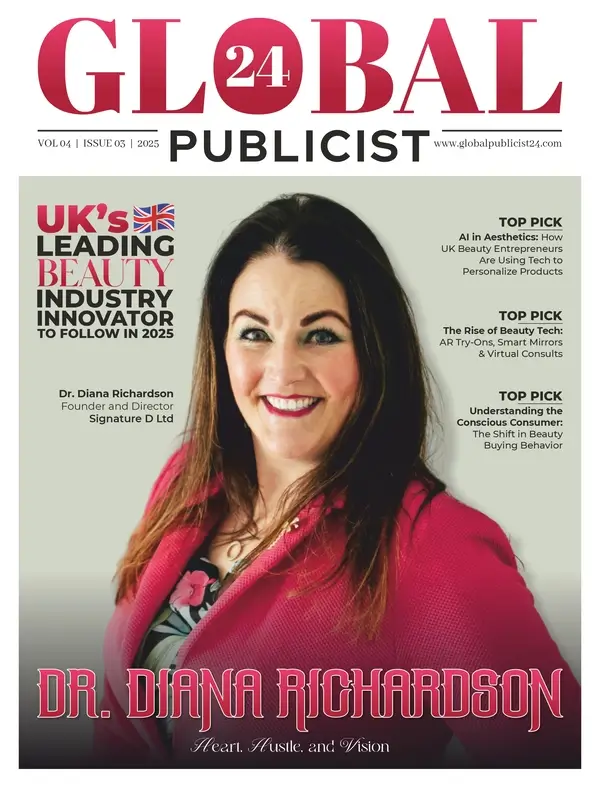The music industry expects a 17.2% revenue boost by 2025, driven by the explosive rise of AI-generated music, as the global generative AI in music market surges from $440 million in 2023 to a projected 30.4% CAGR through 2030. This unprecedented growth isn’t merely technological advancement it represents a fundamental restructuring of creative industries where artificial intelligence democratizes music production while simultaneously threatening established business models and challenging core assumptions about artistic ownership and creativity.
Executive Summary: AI music generators have evolved from experimental tools to enterprise-grade platforms that enable content creators and marketers to produce professional-quality soundtracks in minutes rather than months. However, this rapid adoption has triggered landmark copyright lawsuits from major record labels against leading platforms like Suno and Udio, creating legal uncertainties that could reshape both AI development and music industry economics for decades to come.
Exponential Market Growth Reshaping Creative Economics
The AI in music market is expected to reach $38.7 billion by 2033, projected at a CAGR of 25.8% during the forecast period, reflecting unprecedented demand for automated music creation across industries. This explosive growth stems from fundamental shifts in content consumption patterns, where businesses require vast quantities of original music for digital marketing, video content, gaming, and e-commerce applications.
Cloud-based solutions dominate with 71.4% of AI music market share, enabling businesses to access sophisticated music generation capabilities without substantial infrastructure investments. This accessibility has democratized professional music production, allowing small businesses and individual creators to compete with major studios in terms of content quality and production speed.
The market dynamics reveal a striking transformation in creative asset production. Traditional music licensing costs for commercial use can range from hundreds to thousands of dollars per track, making quality soundtracks prohibitively expensive for many businesses. AI music generators reduce these costs to single digits while offering unlimited customization and instant delivery, creating compelling value propositions that are driving rapid enterprise adoption.
Revenue Model Innovation: Subscription-based AI music platforms generate predictable recurring revenue while offering customers unlimited music creation capabilities. This model contrasts sharply with traditional per-track licensing, providing businesses with cost certainty while enabling unlimited experimentation with musical styles and applications. Leading platforms report customer acquisition costs dropping significantly as word-of-mouth marketing drives organic growth within creative communities.
Content Creator Adoption and Marketing Application Surge
Content creators across platforms have embraced AI music generators as essential tools for video production, podcast creation, and social media marketing. YouTube creators, Instagram influencers, and TikTok producers require constant streams of original music to avoid copyright issues while maintaining audience engagement. AI music generators solve this challenge by providing unlimited, royalty-free soundtracks tailored to specific content requirements.
The marketing industry has experienced particularly dramatic adoption rates. Digital agencies and brand marketing teams utilize AI-generated music for advertising campaigns, corporate videos, and social media content at unprecedented scale. A single marketing campaign might require dozens of musical variations for A/B testing, regional customization, and multi-platform deployment requirements that traditional music licensing cannot economically accommodate.
Performance Marketing Revolution: E-commerce businesses leverage AI music for product videos, promotional content, and brand storytelling across multiple channels. The ability to generate mood-specific soundtracks that align perfectly with brand identity and target audience preferences represents a significant competitive advantage in crowded digital marketplaces. AI-generated music enables rapid content iteration and testing, allowing businesses to optimize emotional resonance and conversion rates through audio branding.
Electronic music leads AI adoption with a 54% rate, reflecting the genre’s natural alignment with digital production methods and its prevalence in modern marketing applications. This adoption pattern indicates how AI music generation is reshaping genre preferences and production approaches across the creative industry.
Copyright Battles and Legal Framework Challenges
The Recording Industry Association of America (RIAA) filed landmark copyright infringement cases against AI music generators Suno and Udio, seeking damages of up to $150,000 per infringing song, which could amount to hundreds of millions of dollars. These legal challenges represent the first major test of fair use protections for AI training data in the music industry, with implications extending far beyond individual platforms to the entire AI development ecosystem.
In August 2024, both Suno and Udio argued that their use of copyrighted materials fell under fair use protections while acknowledging they trained their models on copyrighted content. This legal strategy reflects the broader challenge facing AI developers across industries: balancing innovation with intellectual property rights while establishing sustainable business models that respect creator compensation.
The copyright dispute reveals fundamental tensions between technological capability and existing legal frameworks. Current copyright law developed for human creativity struggles to address scenarios where AI systems create music that may incorporate elements learned from millions of copyrighted works without directly sampling or copying specific recordings. This legal ambiguity creates significant uncertainty for businesses considering AI music adoption while simultaneously driving demand for legally compliant alternatives.
Strategic Legal Implications: Organizations utilizing AI music generators must navigate complex intellectual property landscapes where legal precedents are still developing. Risk management strategies should include comprehensive evaluation of AI platform training data sources, understanding of fair use limitations, and implementation of additional legal protections such as indemnification clauses and insurance coverage for potential copyright claims.
Music creators face 24% of their revenues at risk of loss by 2028 due to generative AI content market expansion, according to recent economic studies. This projection highlights the systemic impact of AI music generation on traditional creative industry business models and the urgent need for new frameworks that balance technological innovation with creator compensation.
Business Model Transformation Across Creative Industries
The emergence of AI music generation is forcing fundamental reconsideration of traditional music industry business models based on scarcity and exclusive access to professional production capabilities. Record labels, music publishers, and licensing organizations face disruption as businesses gain direct access to unlimited, customizable music creation without traditional intermediaries.
Production Company Evolution: Music production companies are repositioning themselves as curators and enhancers of AI-generated content rather than sole creators of original music. Forward-thinking studios now offer AI-assisted composition services, human arrangement and mixing of AI-generated tracks, and hybrid workflows that combine artificial and human creativity for premium offerings. This evolution requires significant investment in new technologies and workforce retraining while potentially reducing overall production costs.
Publishing companies are developing new revenue streams around AI music platforms, offering enhanced licensing services, quality assurance, and legal compliance support for businesses utilizing AI-generated content. These services address the gap between raw AI output and commercially viable music products, creating value through expertise rather than exclusive content access.
Creator Economy Adaptation: Independent musicians and composers are leveraging AI music generators as creative tools and efficiency multipliers rather than replacement technologies. Professional musicians utilize AI for ideation, arrangement assistance, and rapid prototyping while maintaining creative control and artistic vision. This approach enables individual creators to compete with larger studios in terms of output volume and production speed.
Music educators and consultants are developing specialized services around AI music utilization, teaching businesses and creators how to effectively integrate AI tools into their workflows while maintaining quality and originality. This emerging service sector represents significant opportunity for music professionals willing to embrace technological change.
Strategic Implementation for Enterprise Success
Businesses considering AI music integration must develop comprehensive strategies that address creative requirements, legal compliance, and operational integration while maintaining brand consistency and quality standards. Successful implementations require careful evaluation of use cases, platform capabilities, and long-term strategic objectives.
Phase 1: Strategic Assessment and Planning Organizations should conduct thorough analysis of their music requirements across all business functions, including marketing campaigns, product demonstrations, training materials, and customer communications. This assessment should identify opportunities where AI-generated music can reduce costs, improve efficiency, or enable new creative possibilities while evaluating potential risks and compliance requirements.
Market research indicates that businesses utilizing AI music for content creation achieve 40-60% cost reductions in music-related expenses while significantly accelerating content production timelines. These benefits enable more aggressive content strategies and faster response to market opportunities.
Phase 2: Platform Evaluation and Integration AI music platform selection should prioritize commercial licensing clarity, output quality consistency, and integration capabilities with existing creative workflows. Leading platforms offer API access for seamless integration with content management systems, marketing automation platforms, and creative software applications.
Technical integration considerations include output format compatibility, collaboration features for creative teams, and scalability to support enterprise-level content production requirements. Organizations should evaluate platforms based on their specific musical style requirements, customization capabilities, and ability to maintain consistent brand audio identity across all applications.
Phase 3: Workflow Optimization and Scale Successful AI music integration requires redesigned creative workflows that leverage AI capabilities while maintaining quality control and creative oversight. Leading implementations establish hybrid processes where AI handles initial composition and variation generation while human creators focus on refinement, arrangement, and strategic creative decisions.
Performance monitoring and optimization processes ensure AI-generated music continues meeting business objectives and brand standards over time. Organizations should establish feedback loops that capture usage analytics, audience response data, and creative team insights to continuously improve their AI music strategies.
Industry-Specific Applications and Competitive Advantages
Different industries are leveraging AI music generation in ways that reflect their unique content requirements and customer engagement strategies, creating new competitive dynamics and business opportunities across sectors.
Digital Marketing and Advertising: Marketing agencies and in-house creative teams utilize AI music generators for campaign customization, A/B testing, and rapid content iteration. The ability to generate multiple musical variations for different demographics, geographic markets, and platform requirements enables more sophisticated targeting and optimization strategies than traditional music licensing allows.
Performance marketing teams report 25-35% improvements in video engagement rates when utilizing AI-generated music optimized for specific audience segments and platform algorithms. This competitive advantage stems from the ability to create perfectly matched audio-visual experiences that resonate with target audiences while maintaining cost efficiency across large-scale campaigns.
Gaming and Interactive Entertainment: Game developers leverage AI music for dynamic soundtracks that adapt to player behavior, game states, and environmental conditions in real-time. This capability creates more immersive experiences while reducing music licensing costs that traditionally represent significant portions of game development budgets.
Interactive entertainment applications demonstrate AI music’s potential for personalized experiences, with systems generating unique soundtracks based on user preferences, activity patterns, and emotional states. This personalization capability creates stronger user engagement and retention while providing businesses with valuable data about customer preferences and behavior patterns.
Corporate Communications and Training: Enterprise communications teams utilize AI music for corporate videos, training materials, and internal communications that require professional audio quality without the complexity and expense of traditional music licensing. AI generation enables rapid content creation for time-sensitive communications while maintaining consistent audio branding across all corporate materials.
Training and development applications benefit from AI music’s ability to generate educational content soundtracks that enhance learning retention and engagement. Research indicates that appropriately selected background music can improve information retention by 15-25%, making AI music generation a valuable tool for corporate learning initiatives.
Future Market Evolution and Strategic Opportunities
The AI music market is expected to reach approximately $18.47 billion by 2034, with a CAGR of 22.72% between 2025 and 2034, driven by increasing demand for personalized music and sophisticated AI-driven recommendation systems. This growth trajectory reflects expanding applications beyond simple music generation to comprehensive audio intelligence platforms that understand context, emotion, and strategic business objectives.
Emerging Technology Integration: Next-generation AI music systems will incorporate advanced emotional intelligence, real-time collaboration capabilities, and seamless integration with video production, augmented reality, and virtual reality platforms. These capabilities will enable businesses to create fully integrated multimedia experiences where music, visuals, and interactive elements work together to achieve specific business objectives.
The convergence of AI music generation with other emerging technologies like spatial audio, immersive experiences, and interactive media will create entirely new categories of business applications and revenue opportunities. Organizations that establish early capabilities in these integrated approaches will gain significant competitive advantages as markets mature.
Strategic Market Positioning: Companies should view AI music generation as a strategic capability rather than a cost-reduction tool, focusing on how autonomous music creation enables new business models, customer experiences, and competitive positioning. Early adopters are already leveraging AI music to differentiate their brands, accelerate content production, and create more personalized customer experiences than competitors using traditional approaches.
The democratization of professional music production through AI creates opportunities for businesses to develop unique audio branding and content strategies without the traditional barriers of cost, complexity, and creative resource requirements. This shift enables smaller organizations to compete effectively with larger competitors in audio-rich digital marketing and customer experience domains.
Frequently Asked Questions
What is the current size and growth rate of the AI music generation market? The global AI in Music market was valued at $2.9 billion in 2024, with projections reaching $38.7 billion by 2033 at a 25.8% CAGR. This explosive growth reflects increasing enterprise adoption and expanding applications across multiple industries.
How are major record labels responding to AI music generators? Major record labels including Universal, Sony, and Warner have filed copyright infringement lawsuits against AI music platforms Suno and Udio, seeking damages up to $150,000 per infringing song. These cases will establish important legal precedents for AI training data usage and fair use protections.
What specific business applications are driving AI music adoption? Primary drivers include digital marketing content creation, video production, gaming soundtracks, corporate communications, and e-commerce product demonstrations. Businesses report 40-60% cost reductions in music-related expenses while achieving faster content production timelines and greater creative flexibility.
What are the main copyright risks for businesses using AI music generators? AI music platforms acknowledge training their models on copyrighted content while arguing fair use protections, creating legal uncertainty for commercial users. Businesses should implement risk management strategies including platform evaluation, legal compliance review, and potential indemnification coverage.
How do AI music generators impact traditional music creators and industry professionals? Economic studies project that music creators face 24% of their revenues at risk by 2028 due to generative AI market expansion. However, many professionals are adapting by using AI as creative tools and developing new service offerings around AI-assisted music production.
What quality levels can businesses expect from current AI music generation platforms? Modern AI music generators produce commercial-quality output suitable for professional applications including advertising, corporate videos, and digital content. Electronic music leads AI adoption with a 54% rate, indicating particular strength in genres commonly used for business applications.
What future developments should businesses expect in AI music technology? The market is expected to reach $18.47 billion by 2034 with continued 22.72% annual growth, driven by advanced personalization capabilities, real-time generation, and integration with video production and immersive media platforms. Businesses should prepare for increasingly sophisticated AI music capabilities that enable new forms of customer experience and brand differentiation.
About the Author: As a business analyst with over 10 years of experience covering creative technology disruptions and their market implications, I’ve tracked how AI innovations reshape traditional industries. The AI music generation revolution represents one of the most significant challenges to established creative industry models since digital distribution transformed music consumption patterns.
The AI music revolution forces a fundamental question for every business leader: In an era where professional-quality music creation costs approach zero, how will your organization leverage this democratization of creative capability to build stronger customer connections and competitive advantages? The companies that integrate AI music strategically while navigating evolving legal frameworks will define the future of audio-driven customer experience and brand differentiation.
Connect with Global Publicist 24 for deeper insights into how emerging technologies are transforming creative industries and creating new opportunities for business innovation.

